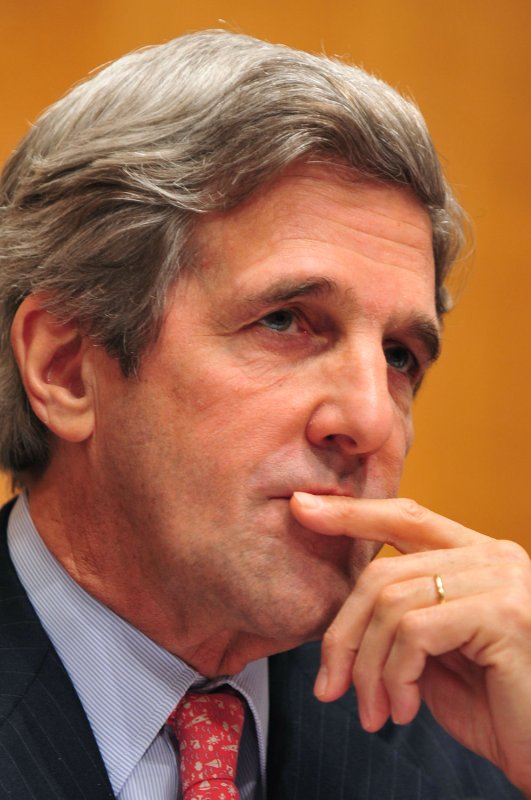Chairman of the Senate Foreign Relations Committee John Kerry (D-MA) delivers opening remarks during a hearing on "Iraq: The Challenging Transition to a Civilian Mission," on Capitol Hill in Washington on February 1, 2011. UPI/Kevin Dietsch |
License Photo
WASHINGTON, Aug. 7 (UPI) -- A former presidential adviser and several Democrats Sunday blamed the U.S. economic downgrade on Tea Party activists in Congress.
"The Tea Party brought us to the brink of a default," David Axelrod, former adviser to President Obama, said on CBS' "Face the Nation."
"For months, the president was saying, let's get together, let's compromise," Axelrod said. "We thought we had such an arrangement with the Speaker of the House ... then he went back to his caucus; he had to yield to the most strident voices in his party. They played brinkmanship with the full faith and credit of the United States. This was the result in that.
"The fact of the matter is that this is essentially a Tea Party downgrade," he declared. "That clearly is on the backs of those who were willing to see the country default."
Late Friday, Standard & Poor's downgraded the United States' credit rating from AAA to AA+ for the first time in history. S&P said it downgraded the rating because the deficit reduction plan passed by Congress wasn't enough to stabilize the country's debt situation and the political climate wasn't conducive to policymaking or as stable as needed to deal with the current economic challenge.
David Beers, head of S&P's government debt rating unit, said on "Fox News Sunday" the downgrade is the rating house saying "that a mild deterioration [is] in the U.S." credit standing … and "we wouldn't expect that much financial impact in terms of higher interest rates for example."
On ABC's "This Week with Christiane Amanpour," S&P Managing Director John Chamber said the ratings agency has been saying for some time that the "fiscal trajectory of the United States was on a bad path and that the political gridlock in Washington leads us to conclude that policymakers don't have the ability to proactively … put the public finances of the U.S. on a sustainable footing. … We think our message has been pretty consistent. And we also think that the numbers speak for themselves."
Larry Summers, Obama's former top economic adviser, said on CNN's "State of the Union" the House Republican majority "played chicken with America's creditworthiness, and America's families are going to be the losers, losers in terms of higher interest rates on their mortgages, losers in terms of what this is going to mean for employment, that we've got critical economic problems."
Echoing Axelrod's sentiments, also on "Face the Nation," was Howard Dean, the former Democratic National Committee chairman.
"I think they're totally unreasonable and doctrinaire and not founded in reality," Dean said. "I think they've been smoking some of that tea, not just drinking it."
On NBC's "Meet the Press," Sen. John Kerry, D-Mass., chairman of Foreign Relations Committee, said the downgrade provided a "partial wake-up call."
"I believe this is, without question, the 'Tea Party downgrade,'" Kerry said. "This is the Tea Party downgrade because a minority of people in the House of Representatives countered even the will of many Republicans in the United States Senate who were prepared to do a bigger deal" of at least $4 trillion that included a mix of reductions, entitlement reforms and revenue enhancement.
On "Face the Nation," Sen. Lindsey Graham, R-S.C., said the Tea Party movement didn't create the economic mess the United States faces.
"The Tea Party hasn't destroyed Washington," Graham said. "Washington was destroyed before the Tea Party got there."
Sen. John McCain, R-Ariz., on "Meet the Press," said he agreed the system in Washington was dysfunctional, but "a lot of it has to do with the failure of the president of the United States to lead. I would remind you that Republicans control one-third of the government."
Beers on "Fox News Sunday" said Congress and the Obama administration were "jointly responsible" for the state of the country's fiscal policy, so the decision to downgrade wasn't politically motivated as has been suggested in some quarters.
"[This] is really not about either political party," Beers said. "It's about the difficulty of all sides in finding, you know, a consensus around fiscal policy choices, now and in the future."
Bill Miller, with Legg Mason Capital Management, told "Fox News Sunday" he didn't anticipate consumers would pay more in interest rates because of the downgrade.
"The downgrade was not an economic event," Miller said. "It was a symbolic and psychological event, an important one."
Summers said the critical problems were slow growth and the lack of jobs and that the long-term budget situation must be adjusted "in a rational way, and we have to find balanced approached going forward -- balanced approaches to focus on the jobs deficit."















